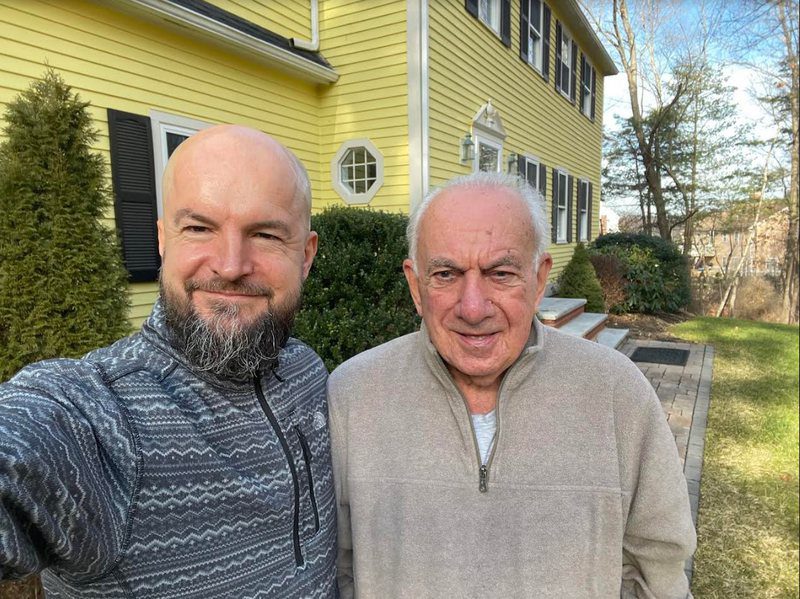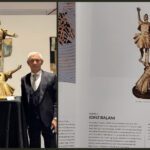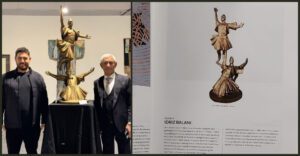Alfred Lela
Westford is an American town about 30 minutes from Boston. If people hope to go to heaven when they die, I think they’d like heaven to look something like Westford. Wilson Farm Road where Peter Lucas lives, perhaps the most famous American journalist of Albanian origin after Bill Kovach, looks more like a golf resort. The houses are without fences and the boundaries are something symbolic marked by trees, mailboxes, or strips of natural grass.
Peter and I have set a meeting for 10 o’clock. A minute later I see him at the top of the road in front of the house, probably waiting for me, but most likely enjoying a sudden change in the weather, rising temperatures, and a generous sun. He lives alone, as I imagine writers should do. The author of several books on Albania, a veteran reporter for the Boston Herald, currently publishes in Boston newspapers three times a week. He leads me into the main room of the house, towards the wall where some pictures are hung. “You see this”, he tells me, “these are metal parts of the American plane that crashed in Albania during the Second World War”. Lucas has written a book about the plane and its crew, fallen somewhere in the highlands of Elbasan, also translated into Albanian.
Commenting on other photos displayed on the wall, among them with President Jimmy Carter, Senators John Kerry, and Ted Kennedy, or with Bill and Hillary Clinton, Lucas remembers an episode with Prime Minister Rama, then mayor of Tirana. “I spoke with Tomas Menino, mayor of Boston, who with my intervention agreed to host Rama, and also to make Boston and Tirana sister cities. I told Rama that I had arranged a meeting, but he said that he was going to California for a photo with Hillary Clinton, then a senator”. I was surprised by this decision, adds Lucas, reasoning that the twinning of Tirana with Boston would bring more to the city than a photo of the mayor with the American senator.
We talk about his ‘strange’ relationship with Sali Berisha. Once, in the early 90s, you were close, then you went cold. Then came your article in the “Boston Herald” where you were critical of the State Department’s decision to declare him non grata. “I have written to the State Department about Berisha’s non grata and I have not received an answer yet. As for the distance we grew into, I don’t know what happened. I think it has to do with my criticisms in the mid-90s. For me, at the time, Berisha began to show signs of autocracy”.
I remind him that Berisha has shown remorse several times regarding events of 1996 and 1997, even last month in several interviews. “Your book “Rrumpalla” – which I have translated into Albanian, must also have played a role. The leftist press has often taken up the expression ‘apres moi le deluge’ (after me, the doomsday), making it a refrain of the typology of a Berisha who, according to them, has always thought about power and not the country”. I add that Lucas in the book has reproduced an expression that had a different meaning or intention, and has been deliberately misinterpreted by the left. Yes, it is, Lucas admits. Berisha, when saying ‘apres moi le deluge’, did not mean ‘after me doomsday’, but a completely opposite meaning: ‘if I leave it will become doomsday’.
And, in fact, that’s what happened after he left, Lucas admits.
Listen, tell Sali, whatever happened between us, ‘Harroje!'” (it is the first and only word he says in Albanian during our conversation). “I respect him a lot for his strength and energy. After all that happened to him in the last year, many others would have given up.”
The conversation moves to Tirana, after his criticism of the numerous constructions in the city and the suspicions that it is about money laundering in the construction industry. “Is the mayor the same Veliaj who was also with “Mjaft”? he asks me. I tell him that it is the same person, reminding him, with a laugh, that his friend Fatos Tarifa had just written a laudatory article about him. Ah, I haven’t seen this Tarifa piece, but I can say that Veliaj is a typical case of the politician who becomes all the things that he himself said he was against.
Couldn’t describe anyone better in a single sentence.
Almost two hours pass into this conversation about politics, Albanian-American relations, and a failed film project of the director Stan Dragoti. Lucas mentions financing by Berisha, at the time he was prime minister, for Dragoti and the plans for the film that were interrupted by the director’s death.
He remembers a conversation with his son, to whom he told that the film “Balkan Ceasar”, based on a script by Lucas, will be made one day for sure, but he will no longer be around to see it.
In a moment of reflection that sums up regret as a descendant of Albanians, and pragmatism as an American, Lucas admits that the golden age of Americans supporting Albanian causes is over. Eliot Engell is no longer a congressman, Lee Zeldin lost the last election for governor of New York, vacating his seat in Congress. You no longer have anyone to lobby for Albanian issues. I have tried to lobby a Boston congresswoman on Albanian issues, but there seems to be little interest. America is becoming introverted, he concludes.
My relationship with Peter Lucas is long-standing and this is my second visit to his home in Westford. What I like about this man is precisely what he has sniffed, with the keen nose of a good journalist: belonging to an old world that believed in a set of rules and principles. That world seems to be dying out and Peter Lucas seems like the last Albanian-American of this bygone era.
As he walks me to the car, it seems to me that his outstretched hand is also a greeting from Anthony Athans, Faik Konica, Fan Noli, Kostë Çekrezi, and others./Politiko.al









Your article helped me a lot, is there any more related content? Thanks! https://accounts.binance.com/pt-BR/register-person?ref=V3MG69RO